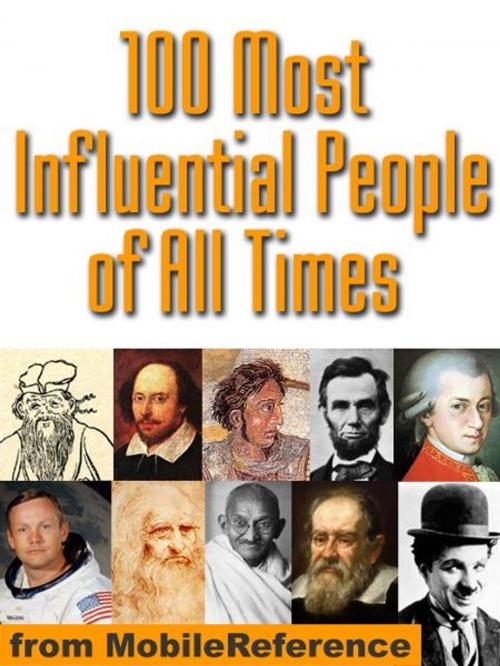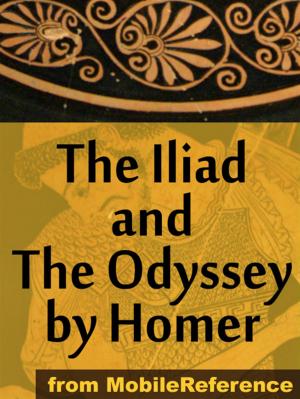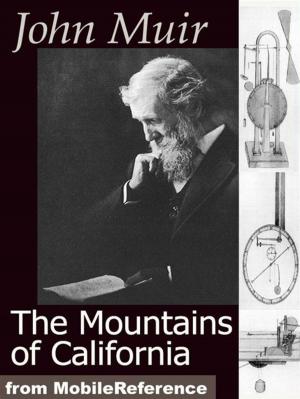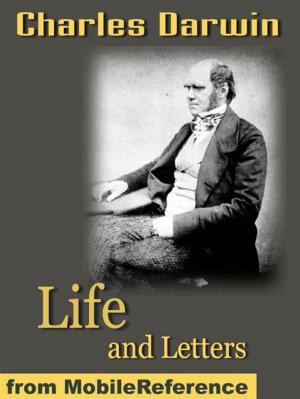100 Most Influential People Of All Times (Mobi History)
Nonfiction, Reference & Language, Reference, Biography & Memoir, History| Author: | MobileReference | ISBN: | 9781605011240 |
| Publisher: | MobileReference | Publication: | January 1, 2010 |
| Imprint: | MobileReference | Language: | English |
| Author: | MobileReference |
| ISBN: | 9781605011240 |
| Publisher: | MobileReference |
| Publication: | January 1, 2010 |
| Imprint: | MobileReference |
| Language: | English |
Learn more about 100 Most Influential People of all times - from Buddha and Hammurabi to Thomas Edison and Brothers Wright. Their lifes, views, and careers illustrated with drawings, photographs, and maps.FEATURES:- Fully illustrated with drawings, photographs, and maps - Navigate from Table of Contents or search for the words or phrases- Written in clear and concise language, TABLE OF CONTENTS: Kings, Emperors and Politicians Religious Leaders Humanitarians Thinkers and Philosophers Scientists Inventors Explorers and Pioneers Musicians and Composers Writers Painters, Sculptors and Architects Stage, Screen and Photography Kings, Emperors and Politicians Menes (ca. 3100-3000 BC) - united Upper and Lower Egypt into one kingdom. Hammurabi (c.1792-1750 BC) - first king of the Babylonian Empire. Cyrus the Great (ca.576-530 BC) - founder of the Persian Empire. Alexander the Great (356-323 BC) - king of Macedon; he conquered most of the world known to the ancient Greeks, never losing a battle. Asoka (304-232 BC) - emperor of India who converted to and spread Buddhism. Qin Shi Huang (260-210 BC) - Chinese Emperor; unified China, initiated construction of the Great Wall of China. Hannibal (247-183 BC) Carthaginian military commander and politician. Julius Caesar (c.100-44 BC) - Roman military and political leader; key role in the transformation of the Roman Republic into the Roman Empire. ...Religious Leaders Zoroaster (c.1200 BC) - ancient Iranian prophet and the founder of Zoroastrianism. Buddha (c.563-c.483 BC) - founder of Buddhism. Jesus Christ (c.6 BC-c.30 AD) - founder of Christianity. St. Paul (b. c. 10-d. c. 67 AD) - proselytizer of Christianity. Muhammad (c.570-632 AD) - Prophet of Islam; conqueror of Arabia. ...Thinkers and Philosophers Lao Zi [Lao Tzu] (c.600 BC) - founder of Taoism. Confucius (551-479 BC) - founder of Confucianism. Socrates (469-399 BC) - ancient Greek philosopher who is credited for laying the foundation for Western philosophy. Plato (c.427-347 BC) - ancient Greek philosopher and mathematician; together with Socrates and Aristotle laid the philosophical foundations of Western culture. Aristotle (384-322 BC) - philosopher, a student of Plato and teacher of Alexander the Great. Niccolo Machiavelli (1469-1527) - philosopher, musician, poet, and romantic comedic playwright; widely known for his treatises on realist political theory (The Prince). ...Scientists Euclid (c.325-c.265 BC) - mathematician; Euclidian geometry. Archimedes (c.287-212 BC) - ancient Greek mathematician and philosopher who made fundamental discoveries in the fields of physics and engineering. Leonardo da Vinci (1452-1519) - Italian polymath: scientist, mathematician, engineer, inventor, anatomist, painter, sculptor, architect, musician, and writer. Nicolaus Copernicus (1473-1543) - astronomer who formulated the first modern heliocentric theory of the solar system. Galileo Galilei (1564-1642) - physicist, astronomer, astrologer, and philosopher; improvements to the telescope, astronomical observations, and effective support for heliocentric theory of the solar system. Rene Descartes [Renatus Cartesius] (1596-1650) - "Founder of Modern Philosophy" and "Father of Modern Mathematics"; the Cartesian coordinate system is named after him; described dualism of machine-like body and a nonmaterial mind; argued that only humans have minds. Johannes Kepler (1571-1630) - mathematician, astronomer and astrologer, best known for his laws of planetary motion. Isaac Newton (1642-1727) - physicist; theory of universal gravitation; laws of motion. ...
Learn more about 100 Most Influential People of all times - from Buddha and Hammurabi to Thomas Edison and Brothers Wright. Their lifes, views, and careers illustrated with drawings, photographs, and maps.FEATURES:- Fully illustrated with drawings, photographs, and maps - Navigate from Table of Contents or search for the words or phrases- Written in clear and concise language, TABLE OF CONTENTS: Kings, Emperors and Politicians Religious Leaders Humanitarians Thinkers and Philosophers Scientists Inventors Explorers and Pioneers Musicians and Composers Writers Painters, Sculptors and Architects Stage, Screen and Photography Kings, Emperors and Politicians Menes (ca. 3100-3000 BC) - united Upper and Lower Egypt into one kingdom. Hammurabi (c.1792-1750 BC) - first king of the Babylonian Empire. Cyrus the Great (ca.576-530 BC) - founder of the Persian Empire. Alexander the Great (356-323 BC) - king of Macedon; he conquered most of the world known to the ancient Greeks, never losing a battle. Asoka (304-232 BC) - emperor of India who converted to and spread Buddhism. Qin Shi Huang (260-210 BC) - Chinese Emperor; unified China, initiated construction of the Great Wall of China. Hannibal (247-183 BC) Carthaginian military commander and politician. Julius Caesar (c.100-44 BC) - Roman military and political leader; key role in the transformation of the Roman Republic into the Roman Empire. ...Religious Leaders Zoroaster (c.1200 BC) - ancient Iranian prophet and the founder of Zoroastrianism. Buddha (c.563-c.483 BC) - founder of Buddhism. Jesus Christ (c.6 BC-c.30 AD) - founder of Christianity. St. Paul (b. c. 10-d. c. 67 AD) - proselytizer of Christianity. Muhammad (c.570-632 AD) - Prophet of Islam; conqueror of Arabia. ...Thinkers and Philosophers Lao Zi [Lao Tzu] (c.600 BC) - founder of Taoism. Confucius (551-479 BC) - founder of Confucianism. Socrates (469-399 BC) - ancient Greek philosopher who is credited for laying the foundation for Western philosophy. Plato (c.427-347 BC) - ancient Greek philosopher and mathematician; together with Socrates and Aristotle laid the philosophical foundations of Western culture. Aristotle (384-322 BC) - philosopher, a student of Plato and teacher of Alexander the Great. Niccolo Machiavelli (1469-1527) - philosopher, musician, poet, and romantic comedic playwright; widely known for his treatises on realist political theory (The Prince). ...Scientists Euclid (c.325-c.265 BC) - mathematician; Euclidian geometry. Archimedes (c.287-212 BC) - ancient Greek mathematician and philosopher who made fundamental discoveries in the fields of physics and engineering. Leonardo da Vinci (1452-1519) - Italian polymath: scientist, mathematician, engineer, inventor, anatomist, painter, sculptor, architect, musician, and writer. Nicolaus Copernicus (1473-1543) - astronomer who formulated the first modern heliocentric theory of the solar system. Galileo Galilei (1564-1642) - physicist, astronomer, astrologer, and philosopher; improvements to the telescope, astronomical observations, and effective support for heliocentric theory of the solar system. Rene Descartes [Renatus Cartesius] (1596-1650) - "Founder of Modern Philosophy" and "Father of Modern Mathematics"; the Cartesian coordinate system is named after him; described dualism of machine-like body and a nonmaterial mind; argued that only humans have minds. Johannes Kepler (1571-1630) - mathematician, astronomer and astrologer, best known for his laws of planetary motion. Isaac Newton (1642-1727) - physicist; theory of universal gravitation; laws of motion. ...















